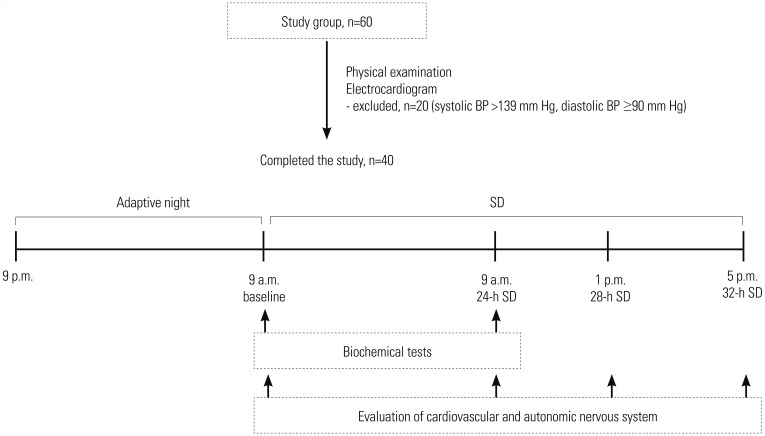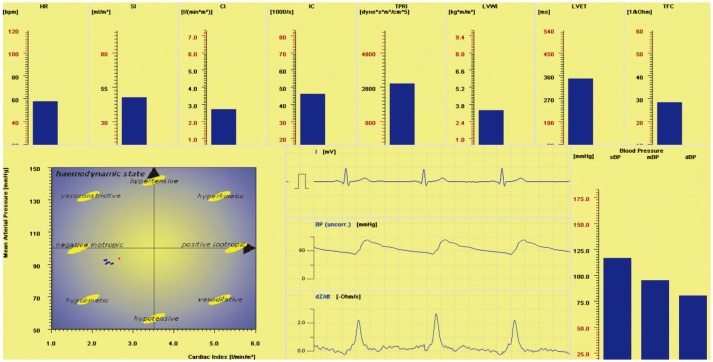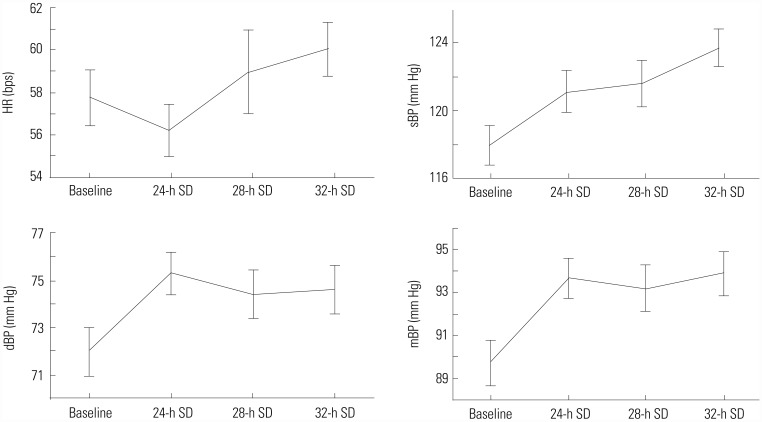Yonsei Med J.
2018 Nov;59(9):1138-1142. 10.3349/ymj.2018.59.9.1138.
Hemodynamic, Autonomic, and Vascular Function Changes after Sleep Deprivation for 24, 28, and 32 Hours in Healthy Men
- Affiliations
-
- 1Department of Hygiene, Epidemiology and Ergonomics, Faculty of Health Sciences, Nicolaus Copernicus University in Torun, Bydgoszcz, Poland. jslomko@cm.umk.pl
- 2Department of Food Chemistry, Faculty of Health Sciences, Nicolaus Copernicus University in Torun, Bydgoszcz, Poland.
- 3Department of Human Physiology, Faculty of Medicine, Nicolaus Copernicus University in Torun, Bydgoszcz, Poland.
- 4Institute for Cellular Medicine, The Medical School, Newcastle University, Newcastle-upon-Tyne, UK.
- KMID: 2422500
- DOI: http://doi.org/10.3349/ymj.2018.59.9.1138
Abstract
- This study aimed to analyze the impact of sleep deprivation (SD) on cardiac, hemodynamic, and endothelial parameters and to determine whether these are sustained with increased periods of SD. The study included 60 healthy men (mean: age 31.2±6.3 years; body mass index 24.6±2.6 kg/m2). Hemodynamic parameters, parameters of myocardial contractility, spectral analysis of heart rate (HR) and blood pressure (BP) variability, and the sensitivity of arterial baroreflex function were evaluated. Biochemical tests were performed to assess L-arginine (L-Arg) and asymmetric dimethylarginine (ADMA) levels in reflection of endothelial nitric oxide synthase ability. Measurements of cardiovascular system parameters were obtained at 9 a.m. (baseline) on the first day of the study and 9 a.m. (24-h SD), 1 p.m. (28-h SD), and 5 p.m. (32-h SD) on the second day. Blood samples for evaluating biochemical parameters were obtained at baseline and after 24-h SD. ANOVA Friedman's test revealed a significant effect for time in relation to HR (χ²=26.04, df=5, p=0.000), systolic BP (χ²=35.98, df=5, p=0.000), diastolic BP (χ²=18.01, df=5, p=0.003), and mean BP (χ²=28.32, df=5, p=0.000). L-Arg and ADMA levels changed from 78.2±12.9 and 0.3±0.1 at baseline to 68.8±10.2 and 0.4±0.1 after 24-hr SD, respectively (p=0.001, p=0.004). SD in healthy men is associated with increases in BP, which appear to occur after 24 hours of SD and are maintained over increasing periods of SD. The observed hemodynamic changes may have resulted due to disordered vascular endothelial function, as reflected in alterations in L-Arg and ADMA levels.
MeSH Terms
Figure
Reference
-
1. Gangwisch JE. A review of evidence for the link between sleep duration and hypertension. Am J Hypertens. 2014; 27:1235–1242. PMID: 24778107.
Article2. Javaheri S, Storfer-Isser A, Rosen CL, Redline S. Sleep quality and elevated blood pressure in adolescents. Circulation. 2008; 118:1034–1040. PMID: 18711015.
Article3. Verdecchia P, Angeli F, Borgioni C, Gattobigio R, Reboldi G. Ambulatory blood pressure and cardiovascular outcome in relation to perceived sleep deprivation. Hypertension. 2007; 49:777–783. PMID: 17261645.
Article4. Cincin A, Sari I, Oğuz M, Sert S, Bozbay M, Atas¸ H, et al. Effect of acute sleep deprivation on heart rate recovery in healthy young adults. Sleep Breath. 2015; 19:631–636. PMID: 25319876.
Article5. Mullington JM, Haack M, Toth M, Serrador JM, Meier-Ewert HK. Cardiovascular, inflammatory, and metabolic consequences of sleep deprivation. Prog Cardiovasc Dis. 2009; 51:294–302. PMID: 19110131.
Article6. Fortin J, Klinger T, Wagner Ch, Sterner H, Madritsch Ch, Grullenberger R. The task force monitor–a non-invasive beat-to-beat monitor for hemodynamic and autonomic function of the human body. In : Proceedings of the 20th Annual International Conference of the IEEE Engineering in Medicine and Biology Society; 29 October–1 November, 1998; Hong Kong.7. Fortin J, Marte W, Grüllenberger R, Hacker A, Habenbacher W, Heller A, et al. Continuous non-invasive blood pressure monitoring using concentrically interlocking control loops. Comput Biol Med. 2006; 36:941–957. PMID: 16483562.
Article8. Franzen PL, Gianaros PJ, Marsland AL, Hall MH, Siegle GJ, Dahl RE, et al. Cardiovascular reactivity to acute psychological stress following sleep deprivation. Psychosom Med. 2011; 73:679–682. PMID: 21949422.
Article9. Robillard R, Lanfranchi PA, Prince F, Filipini D, Carrier J. Sleep deprivation increases blood pressure in healthy normotensive elderly and attenuates the blood pressure response to orthostatic challenge. Sleep. 2011; 34:335–339. PMID: 21358850.
Article10. Sauvet F, Leftheriotis G, Gomez-Merino D, Langrume C, Drogou C, Van Beers P, et al. Effect of acute sleep deprivation on vascular function in healthy subjects. J Appl Physiol (1985). 2010; 108:68–75. PMID: 19910332.
Article11. Ohira T, Tanigawa T, Iso H, Odagiri Y, Takamiya T, Shimomitsu T, et al. Effects of shift work on 24-hour ambulatory blood pressure and its variability among Japanese workers. Scand J Work Environ Health. 2000; 26:421–426. PMID: 11103841.
Article12. Gottlieb DJ, Redline S, Nieto FJ, Baldwin CM, Newman AB, Resnick HE, et al. Association of usual sleep duration with hypertension: the Sleep Heart Health Study. Sleep. 2006; 29:1009–1014. PMID: 16944668.
Article13. Yamasaki F, Schwartz JE, Gerber LM, Warren K, Pickering TG. Impact of shift work and race/ethnicity on the diurnal rhythm of blood pressure and catecholamines. Hypertension. 1998; 32:417–423. PMID: 9740605.
Article14. Holmes AL, Burgess HJ, Dawson D. Effects of sleep pressure on endogenous cardiac autonomic activity and body temperature. J Appl Physiol (1985). 2002; 92:2578–2584. PMID: 12015376.15. Zhong X, Hilton HJ, Gates GJ, Jelic S, Stern Y, Bartels MN, et al. Increased sympathetic and decreased parasympathetic cardiovascular modulation in normal humans with acute sleep deprivation. J Appl Physiol (1985). 2005; 98:2024–2032. PMID: 15718408.
Article16. Pagani M, Pizzinelli P, Traon AP, Ferreri C, Beltrami S, Bareille MP, et al. Hemodynamic, autonomic and baroreflex changes after one night sleep deprivation in healthy volunteers. Auton Neurosci. 2009; 145:76–80. PMID: 19006684.
Article17. Calvin AD, Covassin N, Kremers WK, Adachi T, Macedo P, Albuquerque FN, et al. Experimental sleep restriction causes endothelial dysfunction in healthy humans. J Am Heart Assoc. 2014; 3:e001143. PMID: 25424573.
Article18. Frey DJ, Fleshner M, Wright KP Jr. The effects of 40 hours of total sleep deprivation on inflammatory markers in healthy young adults. Brain Behav Immun. 2007; 21:1050–1057. PMID: 17524614.
Article19. Shearer WT, Reuben JM, Mullington JM, Price NJ, Lee BN, Smith EO, et al. Soluble TNF-alpha receptor 1 and IL-6 plasma levels in humans subjected to the sleep deprivation model of spaceflight. J Allergy Clin Immunol. 2001; 107:165–170. PMID: 11150007.20. Vaara J, Kyröläinen H, Koivu M, Tulppo M, Finni T. The effect of 60-h sleep deprivation on cardiovascular regulation and body temperature. Eur J Appl Physiol. 2009; 105:439–444. PMID: 19002705.
Article21. Sauvet F, Drogou C, Bougard C, Arnal PJ, Dispersyn G, Bourrilhon C, et al. Vascular response to 1 week of sleep restriction in healthy subjects. A metabolic response? Int J Cardiol. 2015; 190:246–255. PMID: 25932797.
- Full Text Links
- Actions
-
Cited
- CITED
-
- Close
- Share
- Similar articles
-
- Effects of Total Sleep Deprivation on Auditory Event-Related Potentials
- Neurocognitive Effect of Transient Sleep Deprivation
- Changes in Human Gene Expression After Sleep Deprivation
- Effects of Total Sleep Deprivation on Visual Discrimination
- The Effect of Total Sleep Deprivation on the Physiological and Cognitive Function




